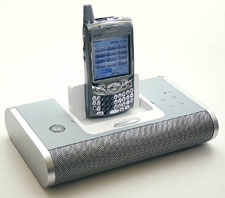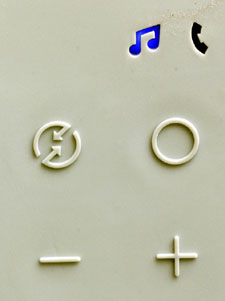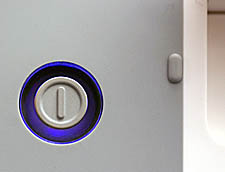 Altec Lansing is a respected name in audio. Their speaker systems, amps, receivers, and the like command high prices and dish up quality specs and awesome sound. So, when I saw Altec Lansing's brand on a music dock / speaker phone specially designed for Treo 650s, I expected to be impressed. Immediately, I searched for the audio specs. Alas, there aren't any.
Altec Lansing is a respected name in audio. Their speaker systems, amps, receivers, and the like command high prices and dish up quality specs and awesome sound. So, when I saw Altec Lansing's brand on a music dock / speaker phone specially designed for Treo 650s, I expected to be impressed. Immediately, I searched for the audio specs. Alas, there aren't any.
Odd. Usually, I expect only companies with something to hide to neglect publishing techie specs on their products. On the other hand, no matter what audiophile store you buy from, hot specs don't necessarily mean great sound. Cold scientific facts can't quantify subtle, subjective issues like the nuances of sympathetic harmonics. Warm-blooded, subjective, non-technical ears perceive sound quality better than a ream of spec sheets and much better than a potload of marketing hype.
Nonetheless, I dialed up Altec Lansing's technical support line and asked for audio specs on the inMotion iMT1. Don't have, I was told. The only information they offer is this PDF spec sheet, which touts "crystal clear" audio and provides zero technical info to substantiate the claim. From Altec Lansing, I expected better.
However, I also expected superior audio quality, and I got it - in a spiffy package that looks fabulous on my cluttered desk. Using my subjective, long-experienced ears, I evaluated the iMT1 inMotion for "crystal clear", and I'm impressed, although crystal it isn't. No way would it ever compete with vintage KLH speakers with 10-inch woofers, or with the venerable Bose 901s I never had, but those delights won't fit either my desk or my plastic. Besides, they're immensely not portable and the umpty-hundred-watt amps they require won't run on four double-A's.
I'd expect true "crystal clear" from Altec Lansing's larger, higher-end audio equipment, too, and the inMotion dishes up nothing even close - otherwise they'd publish the technical information and charge another $400 for it. Yet, it does sound far better than you'd expect for its petite size and portability.
If you're into marketing terminology (insert cynicism of your choice), the company claims the inMotion uses "Superior MaxxBass technology for quality bass without a subwoofer" and warns that patents are pending. So there. It still doesn't beat my 20-year-old home stereo system.
Reality check

The unit has four one-inch drivers (speakers) that the company says are custom designed for the application. Sitting on a table, the iMT1 suffuses my extra-bedroom-turned-office with great sound, certainly up to the quality of the MP3s playing in the Treo - judging all this by ear, of course.
It's much more comfortable than earphones, much louder and higher audio fidelity than the naked Treo, and quite convenient to tote around to clients' conference rooms if I have to give a presentation. In fact, that's exactly the niche I see it in. When you need to play audio around a conference table or group-gripe with a phone caller over a speaker phone in an office conference, the inMotion offers plentiful volume, a great boon to such an application.
As for quality, well� I'm a classical music nut, and I won't settle for noise-ridden piano riffs, squonky French horn solos or screechy violins. Small speakers lose the subtleties that make the music I love. I also groove to low bass, and a device this size can't do it, no matter who builds it.
Boom for the kick-bass, bop for the tom-tom, or deep drone of a bass fiddle, you simply can't get enough low frequencies out of small speakers, no matter what, because getting them means moving massive quantities of air. Meaning large speakers. Large and portable are mutually exclusive. So, patented or not, the challenge is to get as much as you can with audio engineers' magic, trademarked technologies and patent-pending tricks.
 Altec Lansing does an amazing job of getting big sound out of the iMT1, but cold, hard reality prevails and the laws of physics remain unbroken.
Altec Lansing does an amazing job of getting big sound out of the iMT1, but cold, hard reality prevails and the laws of physics remain unbroken.
Besides bass, quality sound comes with precise highs, not difficult to accomplish with small speakers in a small space. The iMT1 does just fine in that department.
Another key element is distortion, the important "THD" (total harmonic distortion) specification that separates the good from the bad and ugly in audio output. To test this, you put an exact, known waveform into the device and observe what comes out - a job for an oscilloscope. Short of such testing, just listen. When music sounds like the orchestra is being chased by tigers, it's distorted. When it sounds like you're standing next to the harpist, it's just fine.
 Altec Lansing's device doesn't distort the Treo's sound at maximum volume as much as the Treo itself does at its max. For best results, I put the Treo's own volume control to a little more than halfway up and adjusted the iMT1 to two-thirds of max. Push either device more than that and you get distortion. More push, more distortion. With both maxed out, the result was unpleasant to listen to.
Altec Lansing's device doesn't distort the Treo's sound at maximum volume as much as the Treo itself does at its max. For best results, I put the Treo's own volume control to a little more than halfway up and adjusted the iMT1 to two-thirds of max. Push either device more than that and you get distortion. More push, more distortion. With both maxed out, the result was unpleasant to listen to.
For sheer volume, the iMT1 has plenty of oomph for general listening without redlining the volume controls. I'd love some audio out ports so it could be hooked up to external amps and speakers when "at home," but the Treo already has an arguably problematic output jack.
Usability
The inMotion iMT1 has two modes: speakerphone and music. Press the button on the right side of the cradle to choose. The music icon over the button glows blue, and the speakerphone button emits a gentle green. The recessed on/off switch has a blue halo. Far out. All of the controls glow whether on battery or not. They're pretty. Worth whatever power they cost. Besides, the company claims a 24-hour playing time per set of batteries.
The device's controls, including its spacey on/off switch, all sit flush with the top of the device. Its lines are clean and simple, very attractive. If my office had a d�cor, I'd say it complemented nicely. Actually, it works well with the d�cor I wish my office had.
 In addition to these controls, the system offers volume plus and minus buttons that don't glow. They don't work that well, either. For one thing, the "minus" button takes a serious push. The minimalist, multi-lingual manual explains that these adjust music volume while the Treo is doing its MP3 thing. They do, but they don't affect the volume level of the Treo, only the amount of amplification that the inMotion applies. The Treo's side rocker switch turns the rock 'n' roll up or down better than the buttons on the iMT1.
In addition to these controls, the system offers volume plus and minus buttons that don't glow. They don't work that well, either. For one thing, the "minus" button takes a serious push. The minimalist, multi-lingual manual explains that these adjust music volume while the Treo is doing its MP3 thing. They do, but they don't affect the volume level of the Treo, only the amount of amplification that the inMotion applies. The Treo's side rocker switch turns the rock 'n' roll up or down better than the buttons on the iMT1.
The iMT1 also lacks tone controls. No bass or treble knobs or sliders, no bass boost knob or equalizer of any kind. Volume up and down is all you get. From a company who�s been making hifi equipment for over half a century, this is a strange, even glaring omission. Your music-playing software has to supply EQ controls, otherwise you have none.
Power >>
Copyright 1999-2016 TreoCentral. All rights reserved :
Terms of Use : Privacy Policy
TREO and TreoCentral are trademarks or registered trademarks of palm, Inc. in the United States and other countries;
the TreoCentral mark and domain name are used under license from palm, Inc.
The views expressed on this website are solely those of the proprietor, or
contributors to the site, and do not necessarily reflect the views of palm, Inc.
Read Merciful by Casey Adolfsson
 Altec Lansing is a respected name in audio. Their speaker systems, amps, receivers, and the like command high prices and dish up quality specs and awesome sound. So, when I saw Altec Lansing's brand on a music dock / speaker phone specially designed for Treo 650s, I expected to be impressed. Immediately, I searched for the audio specs. Alas, there aren't any.
Altec Lansing is a respected name in audio. Their speaker systems, amps, receivers, and the like command high prices and dish up quality specs and awesome sound. So, when I saw Altec Lansing's brand on a music dock / speaker phone specially designed for Treo 650s, I expected to be impressed. Immediately, I searched for the audio specs. Alas, there aren't any.

 Altec Lansing does an amazing job of getting big sound out of the iMT1, but cold, hard reality prevails and the laws of physics remain unbroken.
Altec Lansing does an amazing job of getting big sound out of the iMT1, but cold, hard reality prevails and the laws of physics remain unbroken.
 Altec Lansing's device doesn't distort the Treo's sound at maximum volume as much as the Treo itself does at its max. For best results, I put the Treo's own volume control to a little more than halfway up and adjusted the iMT1 to two-thirds of max. Push either device more than that and you get distortion. More push, more distortion. With both maxed out, the result was unpleasant to listen to.
Altec Lansing's device doesn't distort the Treo's sound at maximum volume as much as the Treo itself does at its max. For best results, I put the Treo's own volume control to a little more than halfway up and adjusted the iMT1 to two-thirds of max. Push either device more than that and you get distortion. More push, more distortion. With both maxed out, the result was unpleasant to listen to.
 In addition to these controls, the system offers volume plus and minus buttons that don't glow. They don't work that well, either. For one thing, the "minus" button takes a serious push. The minimalist, multi-lingual manual explains that these adjust music volume while the Treo is doing its MP3 thing. They do, but they don't affect the volume level of the Treo, only the amount of amplification that the inMotion applies. The Treo's side rocker switch turns the rock 'n' roll up or down better than the buttons on the iMT1.
In addition to these controls, the system offers volume plus and minus buttons that don't glow. They don't work that well, either. For one thing, the "minus" button takes a serious push. The minimalist, multi-lingual manual explains that these adjust music volume while the Treo is doing its MP3 thing. They do, but they don't affect the volume level of the Treo, only the amount of amplification that the inMotion applies. The Treo's side rocker switch turns the rock 'n' roll up or down better than the buttons on the iMT1.